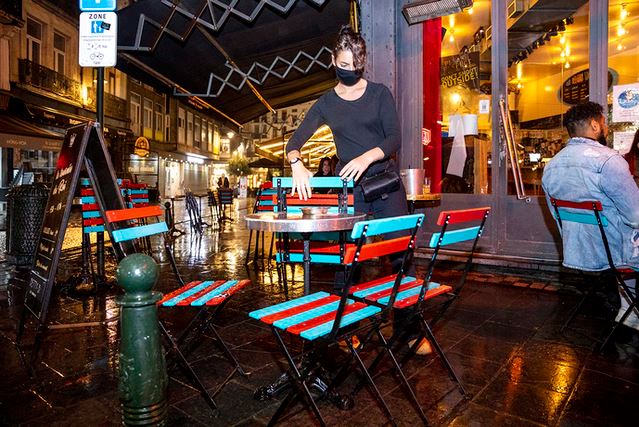The distinction between bars and restaurants in the new stricter coronavirus rules is not justified, according to the Belgian Brewers umbrella organisation, which calls for measures based on official data.
The brewers are asking for "evidence-based policy," as they say there is no sufficient data that shows that bars and cafés are "infection hotspots" - as Federal Health Minister Frank Vandenbroucke said when announcing the stricter rules on Tuesday.
Belgium announced that all cafés and bars would have to close their doors at 11:00 PM from Friday in an effort to slow down the spread of the virus. On Wednesday, the Brussels-Capital Region went one step further and shut down completely all bars, cafés, tea houses, coffee shops and even sports cafeterias on its territory.
However, figures and statistics from other countries show that bars are "not the main culprits," the Belgian Brewers said in a press release.
"In fact, official statistics from our neighbouring countries show the opposite," they said, referring to official figures from the Netherlands, which show that 3% of infections take place in the hospitality industry.
Additionally, the distinction between cafés, bars and tearooms on the one hand and restaurants and snack bars on the other is "inexplicable" to the organisation.
Related News
- Bar or restaurant: Brussels decides on the difference
- Closing Brussels’ bars came too late, experts warn
- Early closure for bars but not restaurants: what is the difference?
On Wednesday, Vandenbroucke said that stricter rules for restaurants would not be put in place, as the measures are easier to organise in a restaurant setting. "You sit at the table, and you stay at the table,” he said on Tuesday.
According to Flemish Minister-President Jan Jambon, the difference depends mostly on people's behaviour, as well as on their alcohol consumption.
"In bars, you start drinking until you – so to speak – go outside again. In restaurants, you come to eat,” he said on Flemish radio. "I am sure that, in a restaurant, there will also be a few people who drink too much and start shouting or singing. But these are rather exceptional cases, whereas this happens more often in café life."
As it stands, it is not entirely clear how many people actually were infected in a bar. “Of all the positive patients, we only have cluster information from a limited number of people,” said infectious disease expert Erika Vlieghe.
“There are a number of clusters in there that have effectively been established in hospitality settings,” she said, pointing out that “super spreading events” often happen in crowded areas, where people talk loudly. “If you translate that into situations in real-life, the transmission is likely in busy bars.”
Additionally, the difference between a bar that serves food and a restaurant is not always clear, according to Director of the Belgian Brewers Nathalie Poissonnier, especially taking into account the "many hybrid hospitality concepts."
In the meantime, however, the Brussels-Capital Region published a Ministerial Decree that defines the difference between "places for the consumption of drinks" and restaurants, to make it clear which businesses can still stay open.
"Not only the businesses themselves but also their suppliers, such as the brewers, are now affected," Poissonnier said. "Since the beginning of the Covid-19 crisis, the entire sector has experienced a huge drop in sales. The reopening of the sector led us to believe that we could still keep losses to a minimum, but with this new measure, that hope is also being dashed."
Maïthé Chini
The Brussels Times

